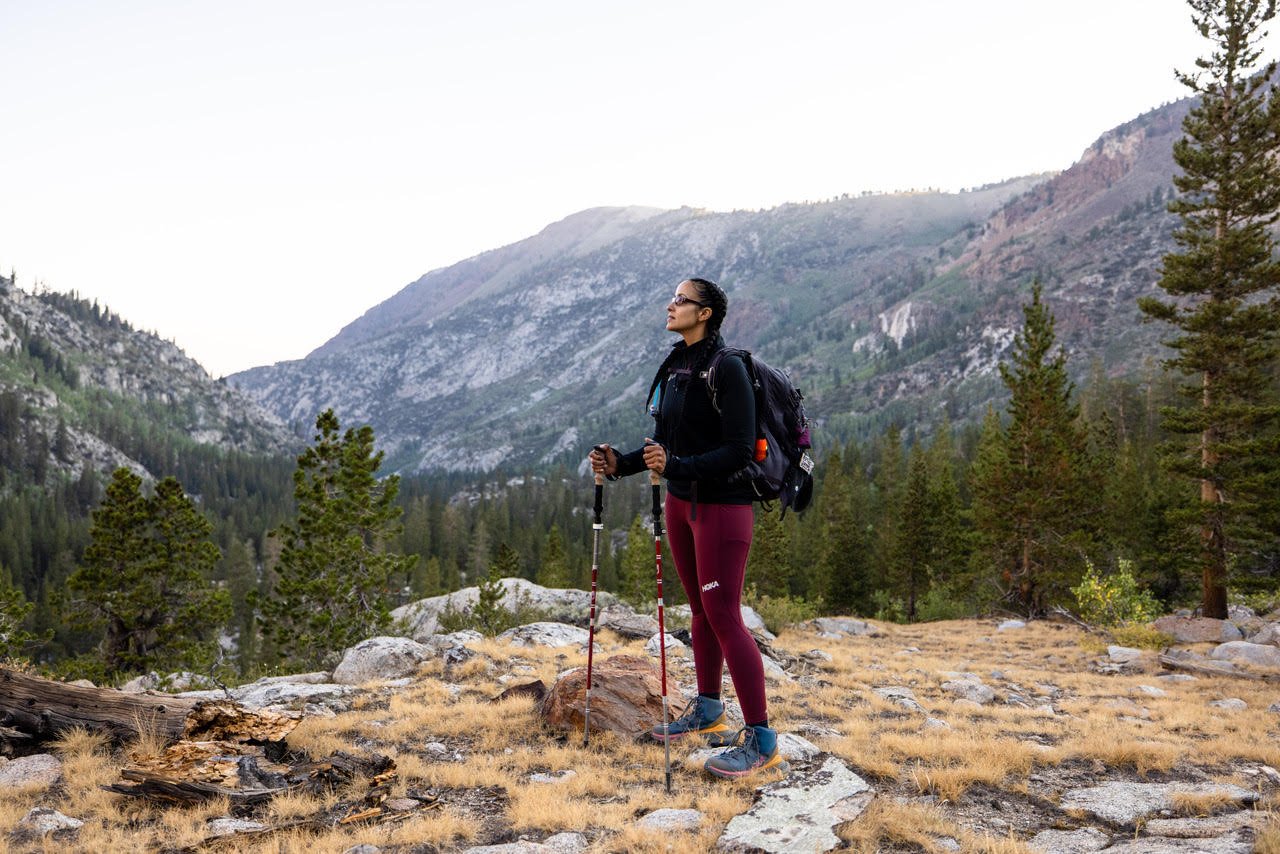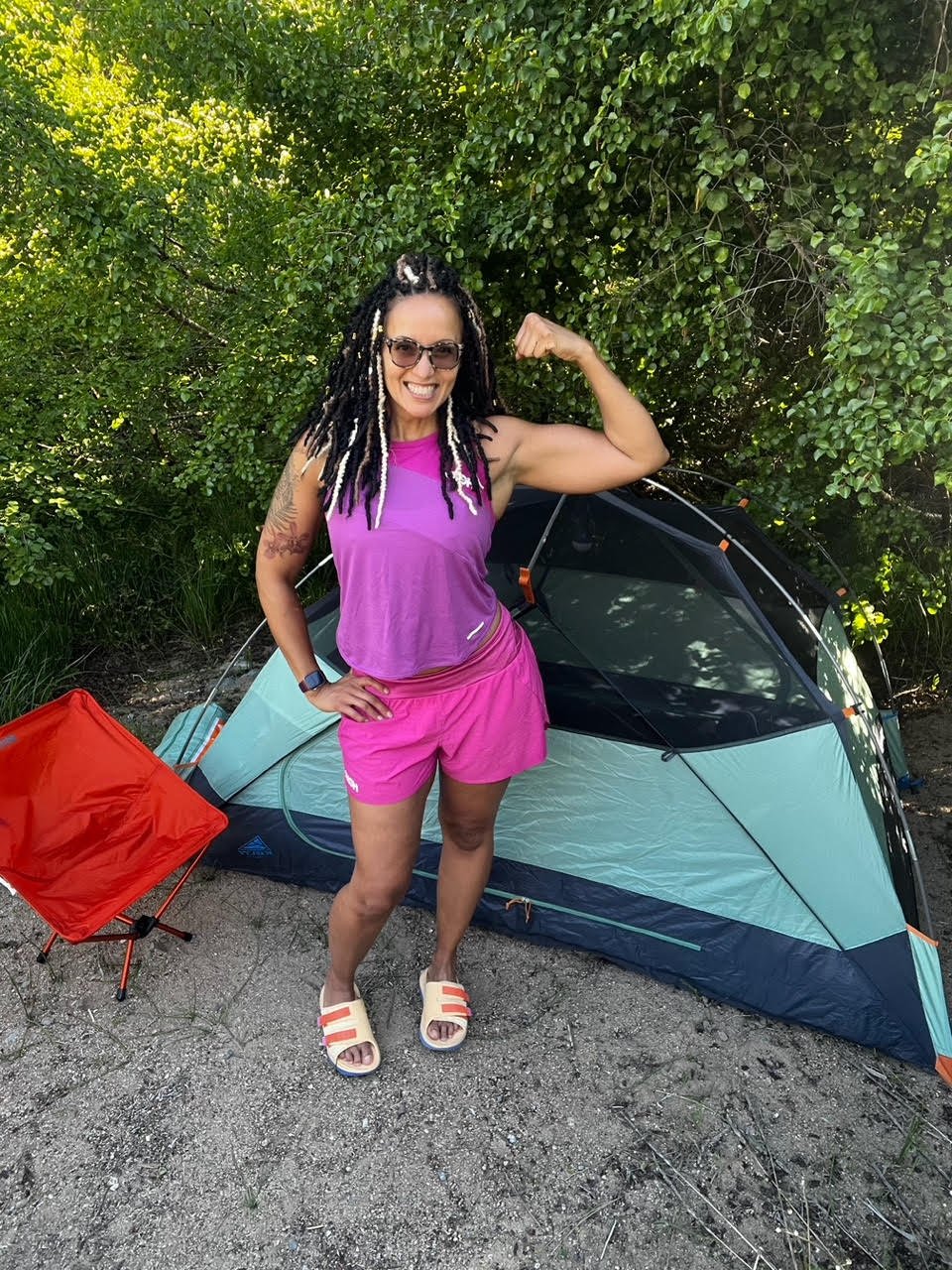Is it Safe to Camp?
Photo by Erik Umphery. Nicole Snell, CEO of Girls Fight Back standing in her strength on a hiking trails in the mountains
In honor of Black History Month, Nicole Snell and Lestarya Molloy discuss personal safety while camping, which is a major concern particularly amongst people of color. As Black women, we know what it is like to be the only out camping, yet the outdoors has been a place of healing and joy for both of us. Despite the misconceptions that "Black people don't camp" or "you never know who's out there," know that the outdoors is an oasis for all of us. We invite you to connect deeply with what prevents you from camping and being outdoors, and incorporate the safety strategies that Nicole provides you. This way you have the knowledge and confidence to get out there.
“I want to go camping, but is it safe to camp?”
“I love the idea of camping, but the lack of security while camping concerns me.”
“I’m curious to go camping. How do you protect yourself while camping? What can I do to ensure campsite security?”
When you’re getting into camping, it can be daunting to think about trading the feeling of safety at home in exchange for sleeping in a tent to camp. As a woman, there is this narrative that we’re weak and helpless. As a person of color, there can be concern about what if I run into someone who looks at you and thinks you don’t belong? In a candid conversation with Nicole Snell who knows what it is like to get into tent camping as an adult and is an award-winning self-defense expert specializing in gender-based violence prevention, boundary setting, and outdoor safety, she shares her approach to camping safety so you have the knowledge and confidence to go for it.
Challenge the restrictive do’s and don’t
There are many well-meaning camping safety tips that share “don’t travel solo” or “safety in numbers.” However, I encourage strategies that come from an empowering approach as opposed to fear, so that you can live your life without the restrictions of what someone else thinks you should and shouldn’t do.
It’s one thing to say “I want to go camping, let’s make it a social time & invite friends” versus “I want to go camping, but I’m dependent on someone else going.” No matter who you are, no matter where you want to go, I want you to be able to go and have the experiences you want to have. You are fully capable of going solo if that is what you choose to do! Plus there are many benefits from having time alone to ground yourself, connect to nature, and enjoy quiet time to yourself. We don’t have to give up those solo joys because of safety concerns. Despite what society may say, you are NOT weak! You are powerful and you have options.
Dispel the misconception that being outdoors is inherently dangerous
There are a lot of misconceptions about encountering strangers in the woods, the lack of security while camping, and how it is dangerous. However 86% of the time, women are assaulted by someone they know — not a stranger. So yes, stranger attacks do happen, but they don’t happen at the frequency that the media can make it seem. The fact is we aren't any less safe being outdoors than we are walking down the street in our neighborhood or in a city.
Connect with your innate power
Just as you get ready for a camping trip and lay out your gear like “I'm going to need my sleeping bag, water, first aid kit, and head lamp.” You may not need your first aid. But you bring it and know how to use everything in it because you want to be prepared for a wide variety of potential situations. You want to have the knowledge available to be able to use each of those individual tools as well. Similarly with safety concerns, self-defense strategies and education are the tools you can take with you anywhere! It's about having the information so you can choose how to respond depending on the situation. Safety is about more than physical skills and in fact research supports that 75% of confrontations are avoided through using verbal skills.
Trust your intuition
Listen to your intuition and trust it. If something feels off or gives you a weird vibe, it's valid to respond to that feeling and do what is needed to get to safety. Your intuition is designed to protect you from danger and gives you signals based on real stimuli- whether you’re consciously aware of it or not. Even if what you’re noticing doesn’t match up to the feeling, it’s there for a reason. Trusting your intuition is about recognizing your response to a situation or environment and responding as needed. That could include walking away or leaving your campsite. Remember, any action you take that gets you to safety is the right thing to do! That campsite and that trail will always be there and you can return another day. (for more on intuition, I recommend the book, The Gift of Fear.)
Stay aware of your surroundings to enhance both safety and enjoyment outdoors
Make sure that you notice your surroundings and if you have a moment where you're just so lost in thought or conversation, take a moment to just remind yourself “I’m going to take a look around.”
Friends comment that I'm the one that is finding the animals and say “Oh look at that…it’s a Red Tail Hawk,” “Oh, look, there's a Horned Lizard,” or “Wow, look at how neat that tree is.” It’s because I’m in awe of nature and I'm using my awareness to help me appreciate things, but I'm also aware of things that could be a potential problem. That gives me the space to decide what my response will be.
Verbal strategies are effective to de-escalate potential threats and set boundaries
One of the best ways to de-escalate a situation is by calmly asking questions. From a psychological perspective, posing questions requires the other person to engage a different part of their brain, leading to what’s known as “pattern interrupt”. This shift can break their one-track thought pattern and contribute to de-escalation. For instance I used this strategy when witnessing an argument. Instead of intervening directly, I asked the person yelling about the time, which helped redirect the energy and de-escalated the situation.
Another approach is to lower your energy, voice, and volume. The priority is ensuring your safety and disengaging as soon as possible, so do whatever is necessary, leaving your ego behind. The best fight is one you never have to fight, and that demonstrates real confidence.
Know your mind, voice, and body are your best tools. Weapons like pepper spray and other external tools are only helpful if you train with them.
Your voice, brain and body are the best tools because you always have them. If you want to have pepper spray or other external tools, you have to train with them consistently. It is not enough to just buy it, or have it and say “Great, I have this thing now, I'm safe.” Having it doesn’t automatically make you safe and not having it doesn’t automatically make you unsafe. In a threatening situation, your body releases adrenaline, impacting your physiological responses, fine motor movement, and logic and reasoning. Without training, the tools may not be as effective as you’d expect. Training with a tool or weapon is directly related to its effectiveness in a dangerous situation…but it is still not a guarantee of safety.
The fact is 89% of the time attacks on women do not use a weapon. If you bring it, now you’ve turned it into a fight with weapons and it could be turned against you. Anything that you carry for protection, you have to train with it. I’m a passionate advocate for education and I avoid encouraging people to put all of your safety and security into something external, whether it be dependent on things or bystanders. We are strong, we are enough.
As you embark on camping, incorporate these self-defense strategies into your toolkit. This way you can enjoy the beauty of camping and do so mindfully. As Nicole says, “When we are empowered to live our lives freely and confidently, there is no limit to what we can do!”
Meet Nik
This camping know-how is shared by Nicole Snell, an award-winning international speaker, trainer, and self-defense expert specializing in gender-based violence prevention, boundary setting, and outdoor safety. She is the CEO of Girls Fight Back (a Black woman owned business), Founder of Outdoor Defense and Lead Instructor with both IMPACT Personal Safety and IMPACT Global. Nicole speaks to women and gender inclusive groups from industries around the world and has facilitated sexual assault prevention trainings at over 90 military installations internationally. Nicole is a credentialed Empowerment Self-Defense Professional and an NACP Credentialed Victim Advocate.
As an outdoor enthusiast Nicole has made it her mission to to use her skills to encourage others to expand their world and do what brings them joy in the outdoors and beyond. She’s an experienced solo hiker/backpacker/camper, solo traveler, and adventurer who has dedicated much of her life to helping others explore with confidence. Nicole has visited 34 countries, hiked in 18 of them, and summited Mt. Whitney in 2022. Nicole is a HOKA Global Advocate and spent 7 years as an adventure leader for the Los Angeles non-profit, Black Girls Trekkin'. She has been featured on Spectrum 1 News for her work with outdoor safety and self-defense, and has been interviewed for Women’s Health Magazine, Backpacker Magazine, Runner’s World, and Outside Magazine. Nicole believes that when we are empowered to live our lives freely and confidently, there is no limit to what we can do!
Follow her on Instagram @adventuresofnik and @girlsfightback, and subscribe to her YouTube to get more self-defense strategies.


